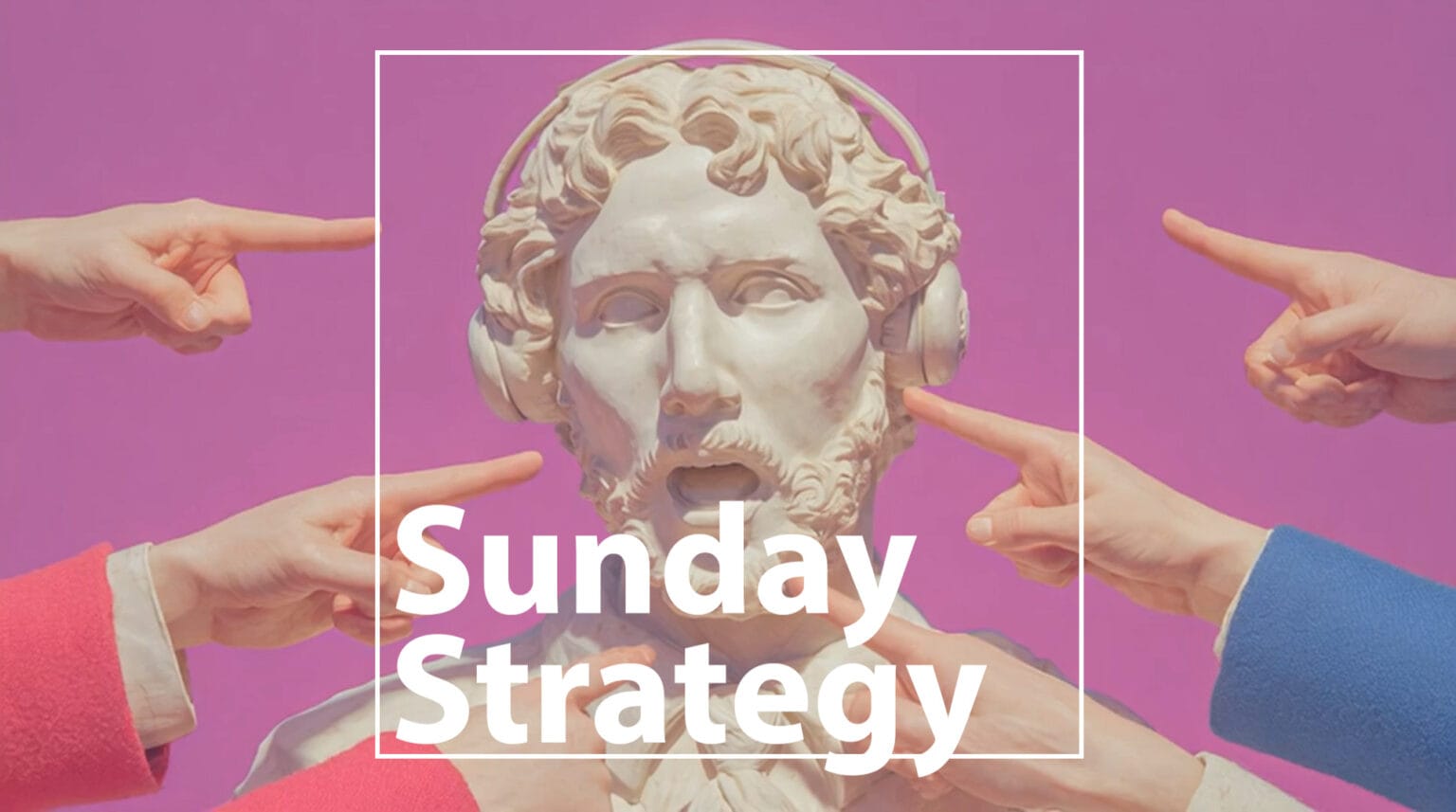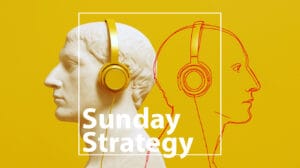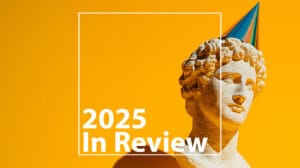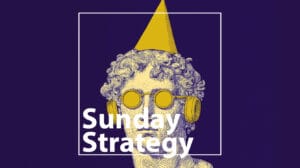In this issue of Sunday Strategy, we look at five stories to think about next week, including: the Embarrassing Internet Culture, Impending Christmas Shopping, AI ‘Workslop’, Signature Event Cocktails and Nouveau Nihilists.
In addition, we have ads from: Euro Jackpot, Guardian US, Sunwater and OpenAI.
// Stories of the Week:
1.) Is the Internet More Embarrassing Than Normal?
Has everything on the internet become fixated on cringe or have generational tastes shifted culture more noticeably from polish to pratfall? Make no mistake, the internet has always run on cringe. However, whereas 2000’s and 2010 internet culture ran on polished aspiration, anti-influencing and authenticity have made what was once cringe the storyline for online content.
As Vox highlights, two Americans who recently traveled to ‘Tunis’ as opposed to ‘To Nice’, and subsequently went viral online, could be a sign of how we’ve fallen for cringe content. It could also be seen as the logical extension of ‘anything for a good story’ or an easy route to 15 minutes of fame online.
Whereas potential travel influencers might have previously kept a travel gaffe like this to their close friends – in exchange for glamorous beach photos, today’s social media content made it an opportunity to be extremely relatable. We’ve always been interested in embarrassing content online, but perhaps recent culture has shifted the focus of ridicule towards ‘Polished’ and ‘Pick-me’. Embarrassment online is constant, but what we find embarrassing might be constantly changing.
2.) Less Than 100 Shopping Days Till Christmas, But How Many Until Campaign Launch?
There’s only 87 days until Christmas and as holiday creep causes Christmas lights to go up in some stores amongst Halloween decorations, when to drop a holiday ad or post may become the consideration for many different marketers. While we’re still a month off from UK Christmas ads dropping (here’s a list of 500+ from the last few decades if you’re missing them), how early is too early to start targeting Christmas shoppers?
Intuit Mailchimp launched a helpful guide to the cadence of Christmas shopping last month and it shows that while a majority of people still don’t fancy a “Nightmare Before Christmas’ style situation of October holiday ads – 40% of early shopping starts at Halloween (and another 20% at Prime Big Deal Days). However, advertisers thinking about going early may need to consider that not every sale has to be a year end holiday sale.
3.) The Rise of AI ‘Workslop’?
Increased AI use doesn’t necessarily mean increased AI productivity within a company. A recent Stanford university study has found that while AI use has doubled within companies since 2023, 95% report no ‘no measurable return on their investment from AI’ – blaming ‘AI workslop’ or low-effort AI created output that appears passable but actually creates more work for co-workers. It masquerades as ‘good work’ but ‘lacks the substance to advance a task’.
Research shows that 40% of workers in the US report being given ‘workslop’ and the cognitive offloading of work enabled by enterprise AI systems, that workers are being forced to use looks to continue growing. In addition, data shows that coworkers sharing ‘workslop’ are seen negatively by others around them. While recent Anthropic research shows ‘full offloading of entry level tasks’ by many firms, to the cost of Gen Z entry level jobs, the quality of the output isn’t acknowledged. As enterprise AI use continues to mature, we need to consider more about how well AI is being leveraged, not just if it’s present within organizations – judging it as harshly as many companies have judged new grad productivity.
4.) Is It Even An Event Without a Signature Cocktail?
While the US team struggled against Europe in this weekend’s Ryder Cup, drink sales at Bethpage Black did not. The Mulligan, golf’s Bourbon based answer to the US Open’s ‘Honey Deuce’, took over where the tennis tournament left off – priced at $19.50, a discount compared to the Honey Deuce’s $23 price tag. While Mulligan sales are still TBC, the more expensive ‘Honey Deuce’ logged 23% YoY sales increases, generating $17m for the tournament.
Gone are the days where the Kentucky Derby’s ‘Mint Julep’ had a monopoly on sport branded drinks. Sitting at the intersection of celebration and merchandise (usually in collectable cups), signature cocktails are purpose built for sharing on social media. Begging the question, is it even a cultural or sporting event if there isn’t a signature drink that comes along with it?
// Chart of the Week: Nouveau Nihilism


IPSOS annual ‘Global Trends’ report has arrived and one of its wider trends looks at ‘Nouveau Nihilism’ – the emerging tendency for people around the globe to ‘live for today’ as tomorrow is increasingly uncertain. While 2/3rds of people around the globe say they ‘live for today’, significant increases were found in the last year amongst Ireland (+10%), Portugal (+8%) and Indonesia (+10%) vs. 2024. In fact, this more immediate focus is now the majority in most global markets, aside from: Sweden, Israel and the Netherlands.
// Ads You Might Have Missed:
1.) ‘Infinite Possibilities’ – Euro Jackpot:
They say the lottery isn’t just about buying a chance to win, but buying a chance to dream about what you would do if you did – and advertising for the lotteries seems to borrow this inspiration. From wild fantasies of mansions to cars and boats, lotto ads often sell an aspirational but expected vision of what life could be like if you win.
However, Sweden’s Euro Jackpot has brought their ‘infinite possibilities’ platform to life in a way that’s simultaneously unique and unexpected for a lottery ad. In the ad, an unloved synth player tries to find an audience until a lottery win results in an intergalactic trip and rockstardom. Selling a fantasy wrapped in a problem, it shows that a lottery dream doesn’t have to be one size fits all – or even rational.


2.) ‘The Whole Picture’ – Guardian US:
The independent press isn’t in a strong place in the US at the moment. As less people get their news from traditional sources and assaults in the courts and culture pile up – less publications are stepping up to be the next ‘Democracy Dies in Darkness’. Instead, pragmatism and liability are the order of the day, creating a vacuum for someone to step into. British newspaper ‘The Guardian’s latest position looks to be moving towards that opportunity, with a targeted first campaign in New York that very simply shows how the publication is global, independent and free. As a venerable British publication in the US, its stance may not need to be more detailed than that to stand out.
3.) ‘…With ChatGPT’ – OpenAI:
OpenAI has launched its first large-scale ChatGPT brand campaign and it reinforces the wider shift in AI, moving from potential and vision to daily life and use. The campaign’s three ads show ChatGPT users achieving something with the platform from doing a pull up, to cooking dinner and planning a road trip – each with a focus on the user supported by overlays that show the conversation they’ve had with the AI.
It contrasts earlier ads like Google Gemini’s 2024 ‘Dear Sydney’ ad, which sparked negativity showing the AI completely writing a fan letter for a child, by positioning AI as a partner for human thought vs. a replacement for it. In a departure from previous technology messaging, it also feels decidedly retro in its color grading and aesthetic, something shared by competitor Anthropic’s recent campaign. We may be seeing a shift where big AI tech wants to cover technology cues and messaging with enough humanity that it can change the conversation from human vs. machine to human supported by machine.
4.) ‘Live Dangerlessly’ – Sunwater:
Can you make water safety near dams and exclusion zones aspirational? Sunwater’s new Australian campaign tries to, abandoning scare tactics to show the risks through humor and quirky character monologues. While the ads take an admirably different tact, it does raise a wider question about the effectiveness of humor in lasting behaviour change when it comes to safety.
Strategically similar to the famous ‘Dumb Ways to Die’ campaign, it acknowledges that scare messaging often triggers defense mechanisms – taking the campaign in an opposite emotional direction. However, a positive emotion alone doesn’t guarantee success; instead, it creates a platform to build upon. ‘Dumb Ways to Die’ used humour plus repetition to deliver a message. TFL’s famous ‘Did you spot the dancing bear’ used humour and a demonstration. Despite a quirky tone and great delivery, does Sunwater build on a humorous tone in a similar way?
// Sunday Snippets
// Marketing & Advertising //
– Nike’s latest NFL ad rewinds the chances that players take without hesitation [Ads]
– Delivery app Favor enlists ‘3 Doors Down’ for musical accompaniment to their latest ad about the consequences of going without [Ads]
– Co-Op Funeralcare breaks down a funeral to the numbers around it and ‘1 brilliant life’ [Ads]
– Miley Cyrus voices a remake of Maybelline’s ‘Maybe Its Maybelline’ tagline [Brands]
– In ‘any pun is worth it territory’, Lewis Capaldi turned ALDI into “Cap-ALDI” with a free concert [Ads]
– Seoul Tourism and JENNIE partner to promote the city in a new tourism campaign [Ads]
– Oreo turns crosswalks into promotional offers outside of Kroger stores [OOH]
– Coffee brand Maxwell House rebrands temporarily to ‘Maxwell Apartment’ to… reflect declining home ownership in the current economy [Ads]
// Technology & Media //
– Meta’s Threads has surpassed X globally in daily mobile users [Social Media]
– Anthropic’s recent data seems to confirm Gen Z’s worst fears – AI is slowly taking over entry level tasks [AI]
– Is Google looking at a second anti-trust fine in the EU? [Media]
– OpenAI looks to build its own in-house ad infrastructure [Media]
– System1 breaks down 70 years of British television advertising [Media]
– The rise of ‘intentional content consumption’ [Social Media]
– ‘The Simpsons’ announce a second feature film, twenty years after the first [Movies]
– Gen Alpha: Mini, mighty and market ready [Research]
// Life & Culture //
– Spotify looks at how Afrobeats is reshaping global style [Music]
– Can Syria rebuild through creating its own ‘Silicon Valley’ [Technology]
– Can running around on all fours make you fitter? [Fitness]
// Until Next Sunday
As always, let me know what you think by email (dubose@newclassic.agency), website or on LinkedIn.You can also listen to an audio summary and discussion of each week’s newsletter on Spotify. We’re also on TikTok!





